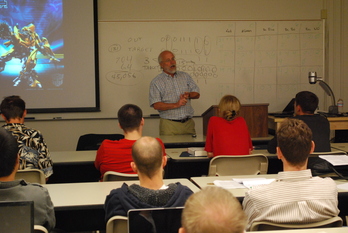 Intelligent Design
Intelligent Design
Center for Science & Culture Announces 2012 Summer Seminars on Intelligent Design
The Center for Science & Culture at Discovery Institute announces two intensive 9-day seminars for college students during the summer of 2012.
 Help us educate the next generation of scientists and scholars.
Help us educate the next generation of scientists and scholars.
Applications are now being accepted for two summer seminars on intelligent design in the natural sciences and the social sciences. This is the CSC’s annual program aimed at upper level college and graduates students who are willing to follow the evidence where it leads. If you are not a candidate for this program, but know students who might be, please help us by referring students to www.discovery.org/summerseminar and encourage them to apply as soon as possible.
As we reported last year:
While Darwinism maintains a monopoly on America’s science classrooms, these students testify to the growing number of young scientists who aren’t satisfied with the way Darwinist professors refuse to address the problems with Darwin’s theory and the strengths of intelligent design.
Of course, this is part of what makes the discussion in that Seattle classroom unique: students awakening to a more full understanding of the relationship between science and nature are able to experience a broad perspective on intelligent design theory, many for the first time. Not only that, but they learn it all firsthand from some of the key scientists and policy experts at Discovery Institute, including Michael Behe, Stephen Meyer, Douglas Axe, Ann Gauger, Wesley J. Smith, David Klinghoffer, Richard Sternberg, Jonathan Witt, Jonathan Wells, Casey Luskin, Jay Richards, and John West.
For registration information click here.
The CSC Seminar on Intelligent Design in the Natural Sciences will prepare students to make research contributions advancing the growing science of intelligent design (ID). The seminar will explore cutting-edge ID work in fields such as molecular biology, biochemistry, embryology, developmental biology, paleontology, computational biology, ID-theoretic mathematics, cosmology, physics, and the history and philosophy of science. The seminar will include presentations on the application of intelligent design to laboratory research as well as frank treatment of the academic realities that ID researchers confront in graduate school and beyond, and strategies for dealing with them. Although the primary focus of the seminar is science, there also will be discussion of the worldview implications of the debate over intelligent design. Participants will benefit from classroom instruction and interaction with prominent ID researchers and scholars. Past seminars have included such speakers as Michael Behe, Stephen Meyer, William Dembski, Jonathan Wells, Paul Nelson, Jay Richards, Douglas Axe, Ann Gauger, Richard Sternberg, Robert Marks, Scott Minnich, and Bruce Gordon. The seminar is open to students who intend to pursue graduate studies in the natural sciences or the philosophy of science. Applicants must be college juniors or seniors or already in graduate school.
The C.S. Lewis Fellows Program on Science and Society will explore the growing impact of science on politics, economics, social policy, bioethics, theology, and the arts during the past century. The program is named after celebrated British writer C.S. Lewis, a perceptive critic of both scientism and technocracy in books such as The Abolition of Man and That Hideous Strength. Topics to be addressed include the history of science, the relationship between faith and science, the rise of scientific materialism, the debate over Darwinian theory and intelligent design, evolutionary conceptions of ethics, science and economics, science and criminal justice, stem cell research and abortion, eugenics, family life and sexuality, ecology and animal rights, climate change, the impact of evolutionary theory on theology, the coverage of science controversies by the newsmedia, legal and public policy conflicts over science education, and the relationship between science and the arts. Participants will benefit from classroom instruction and interaction with prominent researchers, writers, and scholars, such as Michael Behe, Stephen Meyer, Wesley J. Smith, David Klinghoffer, Jonathan Witt, Jonathan Wells, Jay Richards, and John West. The seminar is open to college/university students who intend to pursue careers in the social sciences, humanities, law, or theology.
